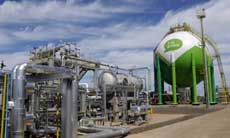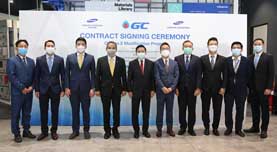Expansions: Braskem invests US$61 mn to expand production of biopolymers; PTTGC awards olefins project to Samsung Engineering

Brazil’s Braskem will expand its production capacity of green ethylene, a raw material produced from sugar cane ethanol and used to produce renewable resins that capture CO 2 from the atmosphere, in Triunfo, in Rio Grande do Sul. The current capacity of 200,000 tonnes/year will increase to 260,000 tonnes/year. The expansion project will start in 2021, is budgeted at US$61 million and should be completed in the fourth quarter of 2022.
Braskem's studies for the production of biopolymers produced from sugar cane began in 2007, at the Technology and Innovation Center of the Triunfo Petrochemical Complex (RS), the largest and most modern research complex in the sector in Latin America. The company invested US$290 million in the construction of the industrial unit and, in 2010, presented to the market the first polyethylene (PE) of renewable origin to be produced on an industrial scale in the world, represented today by the I'm green bio-based brand.
In recent years, Braskem has expanded production by offering new renewable solutions, such as bio-based EVA, a resin used in sectors such as automotive and footwear, among others. Braskem adds that its commitment to creating solutions based on sugarcane is directly related to the company's sustainability strategy, which continues to invest more and more in products developed from renewable raw materials. Today, the portfolio of renewable resins is exported to more than 30 countries and is already used in products from more than 250 major brands, such as Allbirds, DUO UK, Grupo Boticário, Join The Pipe, Johnson & Johnson, Natura & Co, Nissin, Shiseido and Tetra Pak.
Braskem's renewable polyethylene maintains the same quality and versatility as the product of fossil origin, but with the advantage of capturing, throughout its production chain, up to 3.09 tonnes of carbon dioxide for each tonne produced. In the production of renewable EVA the capture is up to 2.1 tonnes of CO 2 per tonne produced. In the case of polyethylene, as the product has been manufactured by Braskem for 10 years, the estimate is that the solution has avoided the emission of 5.54 million tonnes of CO 2 in this period.
The expansion of the biopolymer production capacity will represent a reduction of 185,000 tonnes of CO 2 in Braskem's goal of becoming a carbon neutral company by 2050.

In other news, Thailand’s PTT Global Chemical PCL (PTT GC) has awarded a contract to a subsidiary of Samsung Engineering Co., Seoul, for a project to expand use of propane as a feedstock at PTT GC’s existing olefins operations at Map Ta Phut Industrial Estate in Thailand’s Rayong Province, about 150 km southeast of Bangkok.
As part of the US$120-million contract, Samsung Engineering will provide engineering, procurement, and construction (EPC) services for PTTGC’s proposed Olefins 2 modification project at the Map Ta Phut complex.
The EPC contract award follows PTT GC’s final investment decision to move forward with the project.
Alongside increasing propane usage as a feedstock, PTT GC said the Olefins 2 modification project also aligns with the operator’s broader strategy of enhancing overall feedstock flexibility to ensure long-term competitiveness of the complex.
Scheduled to enter commercial operation during first-quarter 2023, the Olefins 2 modification project will require a total investment of about US$165 million, said PTT GC.
(PRA)
Subscribe to Get the Latest Updates from PRA Please click here
©2021 Plastics and Rubber Asia. All rights reserved.

©2020 Plastics and Rubber Asia. All rights reserved.
Home Terms & Conditions Privacy Policy Webmail Site Map About Us














